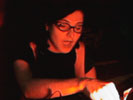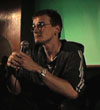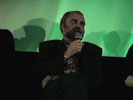| Program
Lecture
Bettina Vissmann, Bettina Vissmann,
Architect, TU Berlin: "Potsdamer Platz Mimicry - Theses on the Construction
of Urban Surfaces"; "Zentrum der Zukunft" ("Center of the Future"):
Promotional video on Potsdamer Platz
Panel
Discussion
Sascha Korp, Director of Marketing
berlin.de (debis), Berlin
Horst Ulrich, head of the City
Information System and Online Services, Office of the Berlin Senate
Hilmar Schmundt, editor and
writer, konr@d (Hamburg),
co-organizer of "softmoderne"
Moderation
Thorsten Schilling und Pit
Schultz, mikro e.V., Berlin
Video
"Millennumania" von Nina
Fischer & Maroan el Sani

Audio
DJ Manuela Krause -electronic
listening-

|
mikro.lounge
#8:
NETZ.STATT.BERLIN
<www.mikro-berlin.org/Events/19981104E.html>
WMF, Johannisstr. 20, Berlin-Mitte
Wednesday, 4 November 1998,
20.00 Uhr
|
mediaweb-tv
Gunter Becker: Berlin.de
im Kreuzverhör. Das Modell der virtuellen Metropole hat nicht
nur Freunde (Tagesspiegel, 6.11.98)
Transcript
of the discussion (German)
deutsch |
A "neue Mitte", a "new middle"
is opened in Berlin at Potsdamer Platz and millions pour in. On the Net,
"berlin.de" is about to be relaunched. Are metropolises disappearing into
their own (imaginary) networks? Are new contexts, forums, markets, communities
being created that leave their counterparts in the real world looking rather
old? Or is this all just a part of the neoliberal process of the deterritorialization
of cities, their gentrification, which is also now beginning to take place
on the Net as well?
In December, "berlin.de"
is to be relaunched: an online community à la AOL with an urban
basis? New content for everyone? A clever marketing move to combine ecommerce
with public content and make it all more attractive? Or is the state (in
this case, the Senate) getting smart and expanding its social care with
new services and transparent information for its citizens? The 5th dimension
for netizens of the next generation?
What sort of urban self-image
are such models based on, what sort of expectations, what sort of new opportunities
arise, what risks and potential limits are there involved? Is the Net replacing
the city or will Berlin become a Net-City?

Bettina Vissmann |
mikro.lounge
#8 began with a lecture by architect Bettina Vissmann, TU Berlin, "Potsdamer
Platz Mimicry - Theses on the Construction of Urban Surfaces," in which
she described the debis portion of Potsdamer Platz as an aspect of mimicry.
"The image of the past becomes reproduction of the present. The use of
old structures is possibly a strategy, similar to the one in biology, which
puts the advantages of mimicry to its own use in that new functions are
encased in old, well-known structures. In this case, a privately owned
company presents itself as a master builder for an entire section of the
city; it disguises itself by using images that are already on hand. debis
is selling its commercial interests under the guise of another, different
architecture. What is at play here is the inability to design new complex
structures, without relying on mimicry of structures or imitation." |
| Hilmar
Schmundt, an editor and writer for Konr@d magazine in Hamburg, established
a similar point with regard to berlin.de in the overall context of Berlin's
project landscape. "We have in Berlin several competing systems. Many projects
have been, parallel with each other, researching similar ideas of creating
a model of the city as well as enhancing contact among citizens or between
citizens and public authorities or companies. |

Hilmar Schmundt |
But the mutual networking remains
somewhat underdeveloped. Another tradition is probably the subcultural
one. On the one hand, Berlin's subculture is up to some unbelievably intriguing
and multifaceted projects, and on the other, if a pronounced heterogeneousness
takes note of too much variety, it tends to miss the opportunity to produce
synergetic effects." According to Schmundt, this could be a reason that
the contract went to debis. Schmundt argued for the creation of a meta
search engine or a mutual platform on the Net that would make the various
heterogeneous Berlin projects navigable and comprehensible. Such an independent
initiative would be preferable in any case to an imitation on the server
of a private company.
| The provocative
question as to whether berlin.de could be such a catalyst for the hetergenous
structure of the Berlin Net landscape triggered responses from Horst Ulrich
of the Office of the Berlin Senate responsible for the city information
system and online services and Sascha Korp, director of marketing for debis,
primus online, berlin.de. |

Sascha Korp |

Horst Ulrich |
The Senate placed
the creation of the virtual city in the hands of a large company. The Public
Private Partnership between the Senate and Primus Online (a joint venture
of debis, the Metro-Gruppe and the Berliner Volksbank) should be realized
as fully as possible at www.berlin.de. |
The Senate decided to choose
debis after a Europe-wide competition. On the one hand, the Senate hoped
that debis would deliver the greatest exposure, while on the other, berlin.de
should be, according to Ulrich, an "open platform", a "quality brand representing
the variety of the city" and this would make it "easily accessible". Sascha
Korp clearly differentiated berlin.de from the "static architecture" of
Potsdamer Platz and defined berlin.de as an "open platform" upon which
the role of debis would be reduced to making a technical and navigable
infrastructure available in order to create space for potential opportunities.
Content is explicitly not to be produced by debis (debis would only exert
minor editorial efforts), but rather, come from the projects themselves.
berlin.de should be "as controversial and heterogeneous as the city," and
in the end, "what becomes of berlin.de is up to the city, not debis."
The questions which arose
during the discussion related primarily to the question, "centralization
tendencies or heterogeneousness?" Within the framework of berlin.de, does
a certain centralization take place with the help of the Senate? Should
the confusing and multifaceted online culture be stamped with a "berlin.de"
logo and should a centralization, a top-down model be created? Hilmar
Schmundt: "Whoever sets up a competition and offers a domain name (berlin.de)
and public information for free is going to receive offers from global
players such as Telekom, IBM and debis, and so, already has a pretty rigidly
defined selection. Smaller projects would need a bit of money in order
to get started, seed money, but that wouldn't be a real investment. There
are very many, very clever projects with a future which came about from
this heterogeneous structure with very little money (Stadtplan.de, developed
by Kulturbox, Fireball and the online version of "die tageszeitung", a
daily paper, developed at the Technical University). And not supporting
them is a big problem, and it will be for some time. berlin.de, on the
other hand, will have a severe credibility problem due to the editors who
select and compile the information. If the editorial team is built by a
large investor from the real estate and telecommunications businesses,
then the value of the information that offered will have no value at all." Hilmar
Schmundt: "Whoever sets up a competition and offers a domain name (berlin.de)
and public information for free is going to receive offers from global
players such as Telekom, IBM and debis, and so, already has a pretty rigidly
defined selection. Smaller projects would need a bit of money in order
to get started, seed money, but that wouldn't be a real investment. There
are very many, very clever projects with a future which came about from
this heterogeneous structure with very little money (Stadtplan.de, developed
by Kulturbox, Fireball and the online version of "die tageszeitung", a
daily paper, developed at the Technical University). And not supporting
them is a big problem, and it will be for some time. berlin.de, on the
other hand, will have a severe credibility problem due to the editors who
select and compile the information. If the editorial team is built by a
large investor from the real estate and telecommunications businesses,
then the value of the information that offered will have no value at all."
If the discussion that followed
took on the "character of a cross-examination," as Gunter Becker wrote
in the November 6 edition of the Tagesspiegel, there were a variety of
reasons: "Among those in the audience were Net activists who had already
negotiated with berlin.de about taking part in the community online platform
but then decided against the free delivery of their content. The logic
of distribution system that would call for the free delivery of content
in return for a portion of any eventual income from advertising seemed
to some of the participants like the selling out of the information and
content they had worked hard to produce. When Ulrich and Korp repeated
again and again that they simply wanted to make an open platform available
with space for any and everyone for their activities, to create a "living
system," they were met with skepticism. The suspicion that those financing
the project would prefer a streamlined presentation of content for reasons
of commercial viability to an authentic reflection of the hetergenous Berlin
landscape was palpable. And the announcement that municipal services, such
as the re-registration of a car, would be offered online for a fee as part
of the city information system was also met with little enthusiasm, as
Horst Ulrich couldn't help noticing. At the same time, the persistent questions
concerning data protection and the possibility of political participation
showed how suspiciously many Berlin online projects view the virtual community."
(Excerpts from Gunter Becker,
"Berlin.de in the crossfire: The model for the virtual metropolis has more
than friends alone," in Der Tagesspiegel, November 6, 1998)
<http://www.tagesspiegel.de/archiv/1998/11/05/in-be-7633.html>
[I.A.] |

